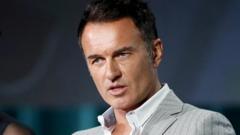Following the death of Pope Francis at the age of 88 due to a stroke, mourners from around the world gathered to honor his transformative impact on the Catholic Church and society. Tributes poured in from global leaders highlighting his commitment to marginalized communities and the call for social justice. The Vatican now faces a critical decision regarding his successor, with discussions ongoing about the future direction of the Church.
The World Reflects on the Legacy of Pope Francis After His Passing

The World Reflects on the Legacy of Pope Francis After His Passing
Pope Francis, the first Latin American pope, passed away at 88, leaving behind a profound legacy that emphasized compassion, inclusivity, and social justice.
April 21, 2025, 2:30 p.m. ET
Pope Francis, who passed away on Monday at the age of 88 after suffering a stroke, ascended from humble beginnings in Argentina to lead over a billion Catholics, championing advocacy for migrants and social justice throughout his papacy. His death has elicited emotional tributes from leaders and followers worldwide, reflecting on the expansive impact of his teachings.
Mourners quickly filled St. Peter's Square, many expressing shock and sorrow as they gathered to remember the pontiff who had appeared in good spirits just a day earlier to bless the crowd on Easter Sunday. In a somber announcement, the Vatican confirmed his passing, marking the end of a 12-year tenure that sought to make the Catholic Church more accessible and inclusive.
Francis was renowned for his outspoken support for the marginalized and his efforts in addressing the Church’s financial crises and sexual abuse challenges. His approach contrasted with the more conservative paths of his predecessors, steering the Church towards a focus on climate change, economic inequality, and the importance of kindness towards immigrants.
In light of Francis's death, questions surrounding his legacy and the future of the papacy have emerged. As the College of Cardinals prepares for a conclave to elect a new pope, the pivotal decision looms over whether a successor will continue Francis's inclusive agenda or revert to more traditional doctrines.
Tributes from global leaders highlight the profound respect and admiration for Francis, acknowledging his compassionate stance towards those in distress. Figures like U.S. President Joe Biden praised his spirit of love and acceptance, while critics echoed sentiments that in a world rife with division, Francis remained a moral beacon advocating for justice and dignity.
As plans unfold for the next steps, including a possible public viewing and the pontiff's funeral, leaders and citizens alike are left to ponder the future, hoping for a continuation of Francis's message of empathy and unity.
The next pope will significantly influence the Church's direction, and discussions are already underway about potential candidates who may align with or challenge Francis's legacy. The mourning for Pope Francis not only underscores a collective loss but also emphasizes the larger narrative of change and continuity within the Catholic Church, a testament to the complex tapestry of faith and leadership in a rapidly evolving world.
Pope Francis, who passed away on Monday at the age of 88 after suffering a stroke, ascended from humble beginnings in Argentina to lead over a billion Catholics, championing advocacy for migrants and social justice throughout his papacy. His death has elicited emotional tributes from leaders and followers worldwide, reflecting on the expansive impact of his teachings.
Mourners quickly filled St. Peter's Square, many expressing shock and sorrow as they gathered to remember the pontiff who had appeared in good spirits just a day earlier to bless the crowd on Easter Sunday. In a somber announcement, the Vatican confirmed his passing, marking the end of a 12-year tenure that sought to make the Catholic Church more accessible and inclusive.
Francis was renowned for his outspoken support for the marginalized and his efforts in addressing the Church’s financial crises and sexual abuse challenges. His approach contrasted with the more conservative paths of his predecessors, steering the Church towards a focus on climate change, economic inequality, and the importance of kindness towards immigrants.
In light of Francis's death, questions surrounding his legacy and the future of the papacy have emerged. As the College of Cardinals prepares for a conclave to elect a new pope, the pivotal decision looms over whether a successor will continue Francis's inclusive agenda or revert to more traditional doctrines.
Tributes from global leaders highlight the profound respect and admiration for Francis, acknowledging his compassionate stance towards those in distress. Figures like U.S. President Joe Biden praised his spirit of love and acceptance, while critics echoed sentiments that in a world rife with division, Francis remained a moral beacon advocating for justice and dignity.
As plans unfold for the next steps, including a possible public viewing and the pontiff's funeral, leaders and citizens alike are left to ponder the future, hoping for a continuation of Francis's message of empathy and unity.
The next pope will significantly influence the Church's direction, and discussions are already underway about potential candidates who may align with or challenge Francis's legacy. The mourning for Pope Francis not only underscores a collective loss but also emphasizes the larger narrative of change and continuity within the Catholic Church, a testament to the complex tapestry of faith and leadership in a rapidly evolving world.



















